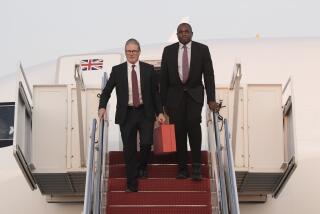U.S., Russia Hope to Seal Arms Deal at Summit
MOSCOW â Playing off their deepening partnership, the United States and Russia announced Monday that they hope to formalize an agreement on strategic weapons cuts, signaling a new approach to arms control, at a summit between President Bush and President Vladimir V. Putin next year.
After talks between Secretary of State Colin L. Powell and Putin at the Kremlin, Russia also said that ongoing and fundamental differences over the 1972 Antiballistic Missile Treaty may not get resolved. But Russian Foreign Minister Igor S. Ivanov also indicated that a U.S. decision to walk out of the historic accord, the cornerstone of modern arms agreements, may not provoke a reprisal by Moscow.
Both developments reflect a single theme: that the new trust between the former superpower rivals no longer requires both nations to take the exact same steps at the same time, make the same cuts or remain at precisely the same arms levels.
The nations are seeking either a formal treaty or a more informal accord that would codify reductions in their nuclear arsenals by the roughly two-thirds that they have been discussing for more than three years.
âBoth of our presidents have charged us . . . to find ways to formalize this agreement--and to try to get the work concluded in time for when they meet in Moscow,â Powell told a news conference with Ivanov.
But the new accord will differ from past arms pacts because the premise is transparency, or exchanging information and providing access, rather than matching numbers that would guarantee mutual deterrence--or mutual destruction.
âFull transparency can be a substitute for the voluminous arms control agreements that weâve had in the past,â said a senior State Department official traveling with Powell. âThis introduces a new approach to arms control.
âItâs an approach that says we donât have to have exactly the same number or have an agreement based on the ability of each one to kill the other.â
Both nations would instead maintain the level of nuclear weapons needed to ensure their own security--from other threats, not each other. Thus the numbers do not necessarily have to match, the senior official said.
The Bush administration announced last month that the United States will cut its nuclear arsenal from under 6,000 warheads to between 1,700 and 2,200, while Putin said during his Washington visit in November that Russia will cut its arsenal by about two-thirds.
Powell had hoped to get a precise number on this trip, but Ivanov said Russia was not ready to reveal its final number--and might not be until the Bush visit next summer.
But Powell said the two sides are now âvery close.â
The senior U.S. official accompanying Powell said later that the United States now has a âmuch clearer picture of where Russia will end up on offensive weapons, how to deal with transparency and how to codifyâ an agreement on cutting their respective nuclear arsenals.
No agreement appears near on the ABM treaty, however, as both sides had hoped. Ivanov said Russia still considers it âthe key element of the entire treaty system of providing or ensuring strategic stability in the world.â
But he said Russia is ânot excluding the possibility that the U.S. may withdraw from the ABM treaty.â Such a move could lead Moscow to take steps to âensure our own national security, to promote the strengthening of the control over the cuts in weapons, as well as the nonproliferation regime.â
Russia clearly has the support of Europe. After his Moscow talks, Powell flew to Berlin to confer with German leaders. At a joint news conference, Chancellor Gerhard Schroeder called for Washington to stick by the historic pact.
âWe want more contractual disarmament, not less,â Schroeder said. He said arms accords should be modified, not scrapped.
Despite the absence of an agreement, the Bush administration appears increasingly comfortable with finding compromises with Putinâs government, a byproduct of the increased cooperation between Washington and Moscow since the Sept. 11 terrorist attacks on the United States.
In talks with members of Russiaâs parliament, Powell was pressed on whether U.S. interests would endure after the war in Afghanistan is over.
âWhat happened on Sept. 11 didnât start something in relations. It only accelerated the process. And Bush wants to make it permanent,â Powell told the Russian legislators, according to U.S. officials.
More to Read
Sign up for Essential California
The most important California stories and recommendations in your inbox every morning.
You may occasionally receive promotional content from the Los Angeles Times.










